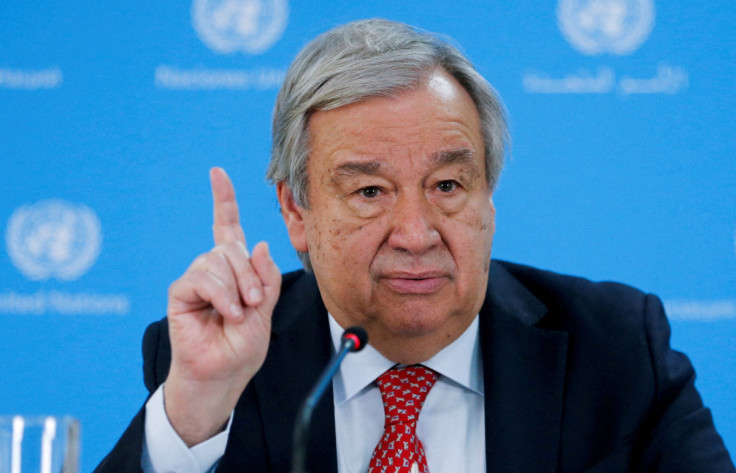Israel To Refuse Visas To UN officials After UN Chief Says 'Hamas Attack Didn't Happen In Vacuum
Israel has also demanded the resignation of UN chief Antonio Guterres.

Israel has said that it will not give visas to United Nations officials, according to a statement by its ambassador to the UN, Gilad Erdan.
This comes after UN Secretary-General Antonio Guterres expressed concern over the loss of civilian lives in Gaza, adding that Hamas's October 7 attack on Israel "did not happen in a vacuum".
The remarks were made by the UN chief at the United Nations Security Council (UNSC) meeting on Tuesday in New York. Guterres said he was "deeply concerned about the clear violations of international humanitarian law that we are witnessing in Gaza."
"The Palestinian people had been subjected to 56 years of suffocating occupation. They have seen their lands steadily devolved by settlements and plagued by violence. Their economy stifled. Their people displaced and their homes demolished. Their hopes for a political solution to their plight have been vanishing," he said.
He further highlighted that the UN fuel supplies in Gaza will run out in a few days and that more needs to be done to extend humanitarian aid to Gaza.
The statement from the UN chief has not gone down well with Israel and the country has demanded the UN chief's resignation.
Israeli Foreign Minister Eli Cohen cancelled a meeting with the secretary-general after his speech at the UNSC. In fact, Ernad later told Army Radio that Israel will refuse to issue visas to UN representatives".
The UN chief later posted a statement on X in an apparent attempt to highlight that he criticised both Hamas and Israel.
"The grievances of the Palestinian people cannot justify the horrific attacks by Hamas. Those horrendous attacks cannot justify the collective punishment of the Palestinian people," he wrote.
Meanwhile, the Palestinian Ministry of Foreign Affairs has slammed Israel for an "unprovoked attack" on the UN chief by demanding his resignation.
What is happening in Israel and Gaza?
More than 6,500 Palestinians, mostly civilians, have been killed in retaliatory Israeli strikes after Hamas launched an unprecedented coordinated attack on Israel earlier this month.
The massive assault by Hamas militants resulted in the deaths of 1,400 people in Israel. They also took more than 200 people as captives. The Hamas gunmen crossed over into Israel by land, sea, and air, attacking the southern and central parts of Israel, including Tel Aviv and Jerusalem.
In retaliation for the Hamas attacks, Israel's prime minister formally declared war against the militant outfit.
The death toll has surpassed that of the third war between Israel and Hamas in 2014, according to the United Nations. It is the deadliest war for Israel since the 1973 conflict with Egypt and Syria.
According to the United Nations, over 1,100 women and 2,000 children, as well as journalists, medical workers, and first responders, have been killed in Gaza. At least 35 UN workers have also been killed.
The UN report claimed that entire neighbourhoods have been reduced to rubble and one million Palestinians have been displaced. The Israeli government, on the other hand, reported that about 200,000 Israelis have been displaced.
"Gaza remains under a full electricity blackout, and hospitals are on the brink of collapse," it said.
UN experts have accused Israel of committing "crimes against humanity" and have called the Gaza blockade "unspeakably cruel".
It has called for an urgent ceasefire and the free movement of humanitarian aid, but to no avail. The United States, in fact, vetoed a Security Council proposal for a humanitarian pause on the killings and the bloodshed. The UK also refused to support the resolution.
However, the United Kingdom has pledged to work closely with Israel and regional partners to address the humanitarian crisis in Gaza.
Hamas, which took control of Gaza in 2005, is considered an Islamist terrorist organisation by dozens of countries. In recent years, Israel's far-right government has been slammed for creating an alleged apartheid between Jewish and Islamic citizens.
© Copyright IBTimes 2025. All rights reserved.





















